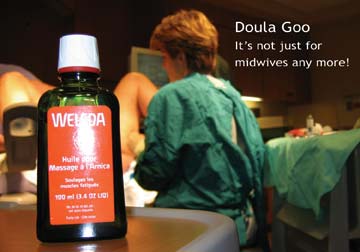If the decreased frequency of my posts lately hasn’t already given me away, let me state now that things are a little crazy for me right now. We’re leaving Saturday for a week’s vacation which means this week I’m frantically trying to wrap up all the summer projects I ignored in lieu of posting to this blog in the last 2 months.
And my client who was due Sunday still hasn’t delivered. She’s at 2 cm, 80% effaced and the baby’s at zero station. She’s been contracting for periods each day. So she could go into labor at any moment and I’ll lose a day’s work. Still, I’d prefer that to her delivering while I’m on vacation. She and her partner are very cool; I think they’re set up for a really nice birth.
In my head things have been busy, too. It began a week ago Sunday, my husband’s and my 12th anniversary coincidentally, when we put up bunk beds ($20 at a garage sale!) in the boys’ room. Our youngest will be 3 in a month, so it was time to move him out of his crib.
I was alone when I took down the crib ($100 with mattress at a garage sale 7 years ago). Who knew that act would bring me to tears? I was surprised to find myself getting choked up as I untied my homemade bumpers from the rails. Wasn’t it just a few months ago I was setting it up for the first time, for my now-seven-year old? And had it really been two years since I set it up for the second time, with the same sheets and skirting and stuffed sock monkey?
There will be no third time to assemble the crib. My husband got a vasectomy yesterday, you see.
We agreed it was the right thing to do. We do not, at 36 years, with the prospect of dual employment for the first time in our married lives on the horizon and two healthy sons whom we adore and who adore each other, wish to start back over with a newborn. This balance we have now, it is a good thing.
So good, in fact, that it honestly outweighs the undeniable attraction of a new family member to meet and love, of another pregnancy to revel in and birth to achieve, of the heavy lids and milky lips on a baby that’s nursed itself into oblivion.
But recognizing that you do not wish to have any more children and taking a [mostly] permanent step to ensure it are two different things. I hate closing doors. I would rather continue our married life using birth control on a day to day basis until those days carry me safely into menopause. Let the sum of our daily reproductive decisions add up to zero, rather than start with an empty set for the rest of our lives.
The vasectomy won out for several reasons, most of them based in pragmatism and comfort. For me, however, there was the one additional reason. No birth control is fool proof. It is one thing for my present family composition to outweigh the benefits of an imagined pregnancy. It would be another to weigh it against an actual pregnancy. I would neither want to bear another child, nor lose another one.








